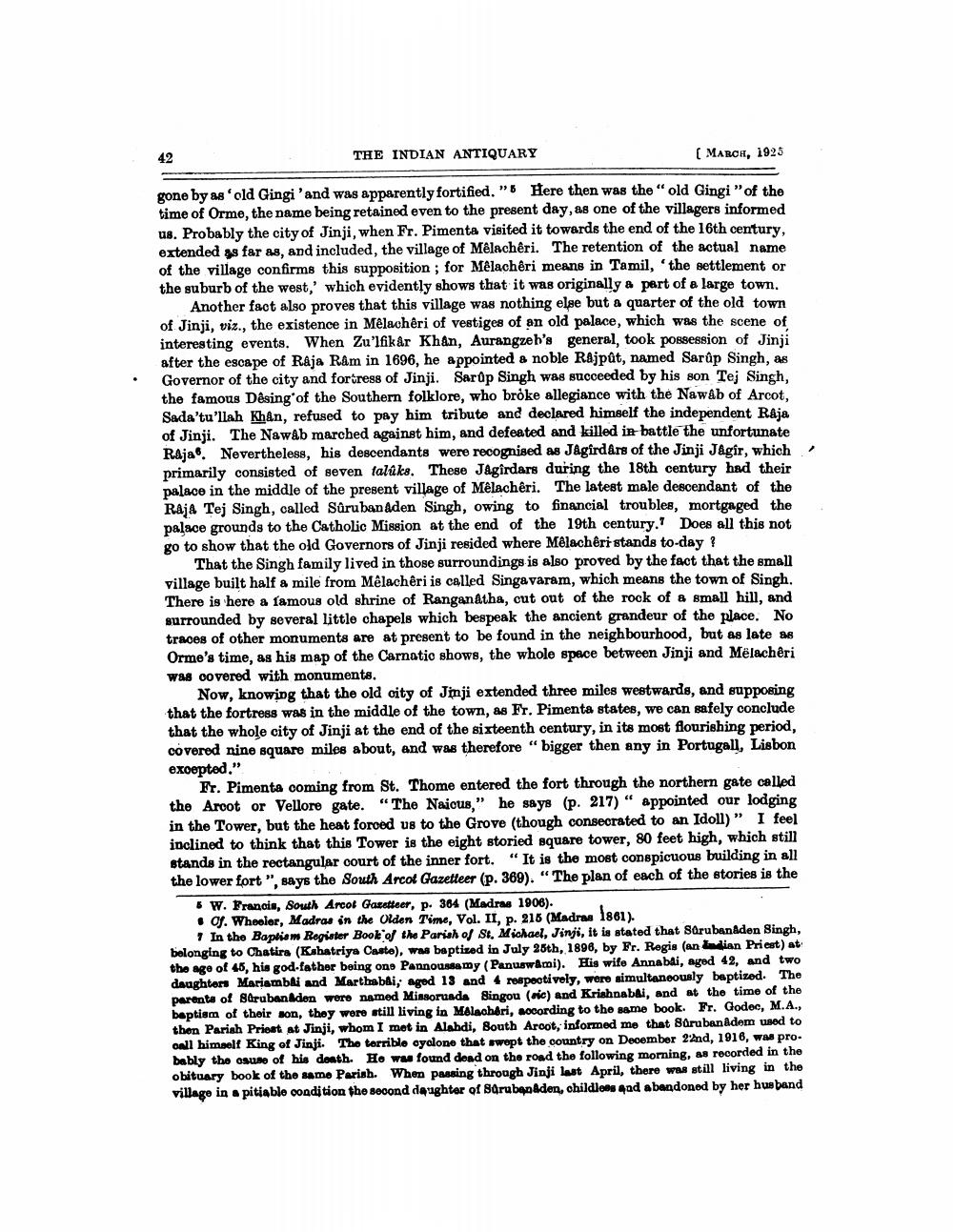________________
THE INDIAN ANTIQUARY
( MARCH, 1925
gone by as old Gingi'and was apparently fortified." Here then was the "old Gingi" of the time of Orme, the name being retained even to the present day, as one of the villagers informed us. Probably the city of Jinji, when Fr. Pimenta visited it towards the end of the 16th century, extended as far as, and included, the village of Mêlachêri. The retention of the actual name of the village confirms this supposition ; for Mêlachêri means in Tamil, 'the settlement or the suburb of the west,' which evidently shows that it was originally a part of a large town.
Another fact also proves that this village was nothing else but a quarter of the old town of Jinji, viz., the existence in Mêlachêri of vestiges of an old palace, which was the scene of interesting events. When Zu'lfikår Khan, Aurangzeb's general, took possession of Jinji after the escape of Raja Ram in 1696, he appointed a noble Rajpat, named Sarůp Singh, as Governor of the city and fortress of Jinji. Sarap Singh was succeeded by his son Tej Singh, the famous Dêsing of the Southern folklore, who broke allegiance with the Nawab of Arcot, Sada'tu'llah Khan, refused to pay him tribute and declared himself the independent Raja of Jinji. The Nawab marched against him, and defeated and killed in battle the unfortunate Raja. Nevertheless, his descendants were recognised as Jagirdars of the Jinji Jagir, which primarily consisted of seven taláks. These Jagirdars during the 18th century had their palace in the middle of the present village of Mêlachêri. The latest male descendant of the Raja Tej Singh, called Sûru banaden Singh, owing to financial troubles, mortgaged the palace grounds to the Catholic Mission at the end of the 19th century.' Does all this not go to show that the old Governors of Jinji resided where Mêlachêri stands to-day?
That the Singh family lived in those surroundings is also proved by the fact that the small village built half a mile from Mêlachêri is called Singavaram, which means the town of Singh. There is here a famous old shrine of Ranganatha, cut out of the rock of a small hill, and surrounded by several little chapels which bespeak the ancient grandeur of the place. No traces of other monuments are at present to be found in the neighbourhood, but as late as Orme's time, as his map of the Carnatic shows, the whole space between Jinji and Melacheri WAS covered with monuments.
Now, knowing that the old city of Jiji extended three miles westwards, and supposing that the fortress was in the middle of the town, as Fr. Pimenta states, we can safely conclude that the whole city of Jinji at the end of the sixteenth century, in its most flourishing period, covered nine square miles about, and was therefore “bigger then any in Portugall, Lisbon exoepted."
Fr. Pimenta coming from St. Thome entered the fort through the northern gate called the Arcot or Vellore gate. "The Naicus,” he says (p. 217)“ appointed our lodging in the Tower, but the heat forced us to the Grove (though consecrated to an Idoll)” I feel inclined to think that this Tower is the eight storied square tower, 80 feet high, which still stands in the rectangular court of the inner fort. "It is the most conspicuous building in all the lower fort", says the South Arcot Gazetteer (p. 369). "The plan of each of the stories is the 5 w. Francis, South Arcot Gazetteer, p. 364 (Madras 1906).
of. Wheeler, Madras in the Olden Time, Vol. II, p. 218 (Madras 1861).
1 In the Baphiam Register Book of the Parish of St. Michael, Jinji, it is stated that SarubanAden Singh, belonging to Chatira (Kshatriya Casto), was baptized in July 28th, 1898, by Fr. Rogis (an dian Priest) at the age of 46, his god father being one Pannoussamy (Panuswami). His wife Annabai, aged 42, and two daughter Mariambai and Marthabhi, aged 13 and 4 rospectively, were simultaneously beptized. The parents of Suruban den were named Missoruada Singou (vic) and Krishnabdi, and at the time of the baptism of their son, they were still living in Malachéri, according to the same book. Fr. Godec, M.A., then Parish Priest at Jinji, whom I met in Alahdi, South Aroot, informed me that Sarubanâdem used to onll himself King of Jinji. The terrible oyolone that swept the country on December 2'And, 1916, wm pro. bably the sun of his donth. Howwe found dead on the road the following morning, as recorded in the obituary book of the same Parish. When passing through Jinji last April, there was still living in the village in a pitiable condition the second daughter of Suruba Aden, childon had abandoned by her husband




